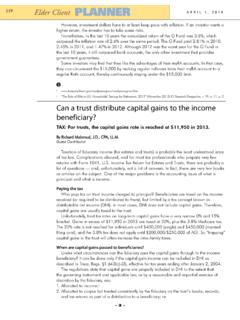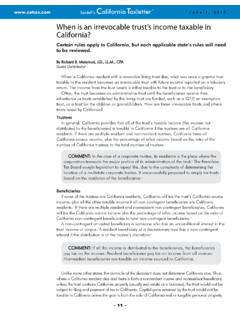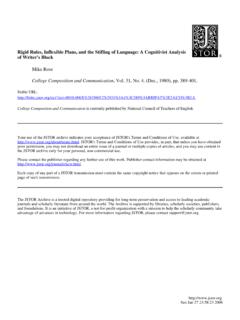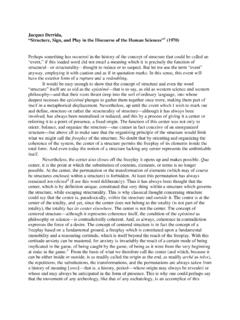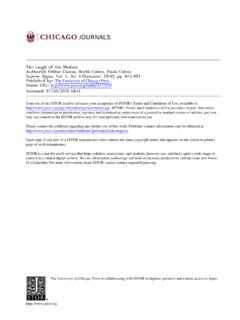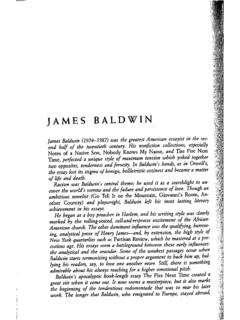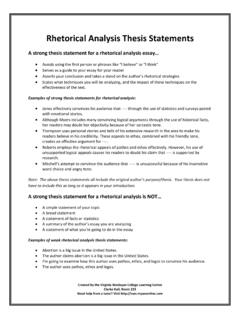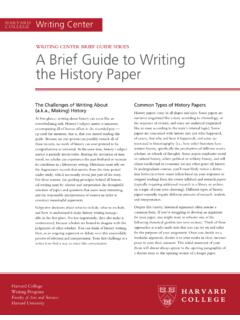Transcription of On Bullshit
1 On BullshitHarry FrankfurtPrinceton UniversityOne of the most salient features of our culture is that there is somuch Bullshit . Everyone knows this. Each of us contributes hisshare. But we tend to take the situation for granted. Most peopleare rather confident of their ability to recognize Bullshit and toavoid being taken in by it. So the phenomenon has not arousedmuch deliberate concern, or attracted much sustained inquiry. Inconsequence, we have no clear understanding of what Bullshit is,why there is so much of it, or what functions it serves. And welack a conscientiously developed appreciation of what it means tous. In other words, we have no theory. I propose to begin thedevelopment of a theoretical understanding of Bullshit , mainly byproviding some tentative and exploratory philosophical analysis . Ishall not consider the rhetorical uses and misuses of Bullshit . Myaim is simply to give a rough account of what Bullshit is and howit differs from what it is not, or (putting it somewhat differently)to articulate, more or less sketchily, the structure of its suggestion about what conditions are logically both necessaryand sufficient for the constitution of Bullshit is bound to besomewhat arbitrary.
2 For one thing, the expression Bullshit isoften employed quite loosely simply as a generic term of abuse,with no very specific literal meaning. For another, thephenomenon itself is so vast and amorphous that no crisp andperspicuous analysis of its concept can avoid being it should be possible to say something helpful, eventhough it is not likely to be decisive. Even the most basic andpreliminary questions about Bullshit remain, after all, not onlyunanswered but unasked. So far as I am aware, very little workhas been done on this subject. I have not undertaken a survey ofthe literature, partly because I do not know how to go about it. Tobe sure, there is one quite obvious place to look the OxfordEnglish Dictionary. The OED has an entry for Bullshit in thesupplementary volumes, and it also has entries for variouspertinent uses of the word bull and for some related terms.
3 I shallconsider some of these entries in due course. I have not consulteddictionaries in languages other than English, because I do notknow the words for Bullshit or bull in any other worthwhile source is the title essay in The Prevalenceof Humbug by Max Black. I am uncertain just how close inmeaning the word humbug is to the word Bullshit . Of course, thewords are not freely and fully interchangeable; it is clear that theyare used differently. But the difference appears on the whole tohave more to do with considerations of gentility, and certain otherrhetorical parameters, than with the strictly literal modes ofsignificance that concern me most. It is more polite, as well asless intense, to say Humbug! than to say Bullshit ! For the sakeof this discussion, I shall assume that there is no other importantdifference between the two, Black suggests a number of synonymsfor humbug, including the following: balderdash , claptrap , hokum , drivel , buncombe , imposture , and quackery.
4 This list of quaint equivalents is not very helpful. But Black alsoconfronts the problem of establishing the nature of humbug moredirectly, and he offers the following formal definition:Humbug: deceptive misrepresentation, short oflying, especially by pretentious word or deed, ofsomebody s own thoughts, feelings, or very similar formulation might plausibly be offered asenunciating the essential characteristics of Bullshit . As apreliminary to developing an independent account of thosecharacteristics, I will comment on the various elements of Black misrepresentation: This may sound pleonastic. Nodoubt what Black has in mind is that humbug is necessarilydesigned or intended to deceive, that its misrepresentation is notmerely inadvertent. In other words, it is deliberatemisrepresentation. Now if, as a matter of conceptual necessity, anintention to deceive is an invariable feature of humbug, then theproperty of being humbug depends at least in part upon theperpetrator s state of mind.
5 It cannot be identical, accordingly,with any properties either inherent or relational belongingjust to the utterance by which the humbug is perpetrated. In thisrespect, the property of being humbug is similar to that of being alie, which is identical neither with the falsity nor with any of theother properties of the statement the liar makes, but whichrequires that the liar makes his statement in a certain state ofmind namely, with an intention to deceive. It is a furtherquestion whether there are any features essential to humbug or tolying that are not dependent upon the intentions and beliefs ofthe person responsible for the humbug or the lie, or whether it is,on the contrary, possible for any utterance whatsoever to be given that the speaker is in a certain state of mind a vehicle ofhumbug or of a lie. In some accounts of lying there is no lie unlessa false statement is made; in others a person may be lying even ifthe statement he makes is true, as long as he himself believes thatthe statement is false and intends by making it to deceive.
6 Whatabout humbug and Bullshit ? May any utterance at all qualify ashumbug or Bullshit , given that (so to speak) the utterer s heart isin the right place, or must the utterance have certaincharacteristics of its own as well?Short of lying: It must be part of the point of saying thathumbug is short of lying, that while it has some of thedistinguishing characteristics of lies, there are others that it this cannot be the whole point. After all, every use oflanguage without exception has some, but not all, of thecharacteristic features of lies if no other, then at least thefeature simply of being a use of language. Yet it would surely beincorrect to describe every use of language as short of s phrase evokes the notion of some sort of continuum, onwhich lying occupies a certain segment while humbug is locatedexclusively at earlier points.
7 What continuum could this be, alongwhich one encounters humbug only before one encounters lying?Both lying and humbug are modes of misrepresentation. It is notat first glance apparent, however, just how the difference betweenthese varieties of misrepresentation might be construed as adifference in by pretentious word or deed: There are two pointsto notice here. First, Black identifies humbug not only as acategory of speech but as a category of action as well; it may beaccomplished either by words or by deeds. Second, his use of thequalifier especially indicates that Black does not regardpretentiousness as an essential or wholly indispensablecharacteristic of humbug. Undoubtedly, much humbug ispretentious. So far as concerns Bullshit , moreover, pretentiousbullshit is close to being a stock phrase. But I am inclined tothink that when Bullshit is pretentious, this happens becausepretentiousness is its motive rather than a constitutive element ofits essence.
8 The fact that a person is behaving pretentiously is not,it seems to me, part of what is required to make his utterance aninstance of Bullshit . It is often, to be sure, what accounts for hismaking that utterance. However, it must not be assumed thatbullshit always and necessarily has pretentiousness as its .. of somebody s own thoughts, feelings, orattitudes: This provision that the perpetrator of humbug isessentially misrepresenting himself raises some very centralissues. To begin with, whenever a person deliberatelymisrepresents anything, he must inevitably misrepresenting hisown state of mind. It is possible, of course, for a person tomisrepresent that alone for instance, by pretending to have adesire or a feeling which he does not actually have. But supposethat a person, whether by telling a lie or in another way,misrepresents something else.
9 Then he necessarily misrepresentsat least two things. He misrepresents whatever he is talking about , the state of affairs that is the topic or referent of hisdiscourse and in doing this he cannot avoid misrepresentinghis own mind as well. Thus, someone who lies about how muchmoney he has in his pocket both gives an account of the amountof money in his pocket and conveys that he believes this the lie works, then its victim is twice deceived, having one falsebelief about what is in the liar s pocket and another false beliefabout what is in the liar s it is unlikely that Black wishes that the referent of humbugis in every instance the state of the speaker s mind. There is noparticular reason, after all, why humbug may not be about otherthings. Black probably means that humbug is not designedprimarily to give its audience a false belief about whatever state ofaffairs may be the topic, but that its primary intention is rather togive its audience a false impression concerning what is going onin the mind of the speaker.
10 Insofar as it is humbug, the creation ofthis impression is its main purpose and its point. UnderstandingBlack along these lines suggests a hypothesis to account for hischaracterization of humbug as short of lying. If I lie to youabout how much money I have, then I do not thereby make anexplicit assertion concerning my beliefs. Therefore, one mightwith some plausibility maintain that although in telling the lie Icertainly misrepresent what is in my mind, this misrepresentation as distinct from my misrepresentation of what is in my pocket is not strictly speaking a lie at all. For I do not come right outwith any statement whatever about what is in my mind. Nor doesthe statement I do affirm , I have twenty dollars in mypocket imply any statement that attributes a belief to me. Onthe other hand, it is unquestionable that in so affirming, I provideyou with a reasonable basis for making certain judgments aboutwhat I believe.

